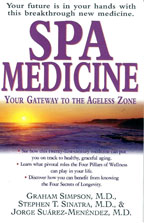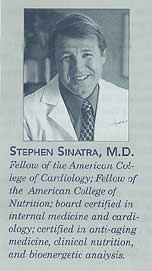
Articles and Books
"Smart Aging Series - Part 1: Skin Health" Dr. Stephen Sinatra, M.D.
June 2002
The health of the skin is of special interest to me because my mother had skin cancer, and I've had a pre-cancerous lesion removed from my back. Overall, skin cancer is increasing at an alarming rate, and researchers predict that cases will probably double in the next ten years.
I'm sure you've heard these frightening statistics before, but my point is that they continue to show we're doing nothing about the issue. Most people attribute the increase in skin cancer to environmental factors like the thinning of the ozone layer. That's part of the problem, but human nature plays a significant role, too. While we may not be able to control the ozone layer, it's certainly possible to adjust our own health habits.
SUNBATHING: YOUR TICKET TO WRINKLES, CANCERSo many people feel they look healthier with "a little" sun. According to a recent survey by the American Academy of Dermatology, 81 percent of respondents thought they looked their best after having been out in the sun. but I've got to tell you, if you've been out in the sun long enough for your skin to change color - tan or pink - you've been out too long. Sun exposure is yet another topic in which a little is good (we all need regular sun exposure of very short duration, about 15 minutes a day on average, to help protect against osteoporosis and maintain mood), but more is definitely detrimental.
Persuasive evidence shows that all three types of skin cancer - basal cell carcinoma (BCC), squamous cell carcinoma (SCC), and melanoma - are cause by sun exposure. People who are really playing with fire include those:
- With repeated occupational sun exposure, like construction workers, farmers, landscapers.
- With frequent recreational exposures, who are at greatest risk for BCC and melanoma.
- With a history of sunburn (yes, even one bad sunburn in childhood is enough) or benign skin damage such as brown spots and hyperpigmentation.
- Who use tanning beds (tanning salons are "Little Houses of Horror" in my estimation) or sunlamps (not to be confused with lamps that emit natural light).
Chronic damage from sunlight makes possible the skin aging process (known medically as photoaging) and the creation of patches of rough, scaly skin that can become actinic keratoses, the earliest beginnings of skin cancer. If these patches do transform into skin cancer, it's of the squamous cell variety. Squamous cell is a low-grade affliction, but left untreated, it can spread and potentially invade deeper tissues.
THE ABCs of SUN DAMAGE
There are three types of ultraviolet rays - UVA, UVB, and UVC, listed in order from weakest to strongest. Despite its thinning, the ozone layer is still absorbing all the UVC in sunlight, according to the National Aeronautics and Space Administration. That's a good thing, because if it weren't we'd all be dead.
UVB rays, the second strongest and most invasive of the sun's rays, are more intense during summers months, especially at higher altitudes and in areas close to the equator. These rays are the most common cause of the sunburns that result in accelerated skin aging. Long-term exposure can cause skin cancers and other immune system alterations.
UVA rays usually maintain a constant intensity throughout the year. They can penetrate skin layers deeply, damaging collagen and elastin without your knowing it, because there's no telltale sunburn. UVA also passes through glass and is generated by fluorescent lights, so it's a problem even in the office. The upshot: UVA is not safe for high-intensity exposure, no matter what tanning salon operators may tell you.
SUN-SMART SUNBLOCK
Certainly avoiding prolonged direct exposures to UV light is the first step in the right direction, and any sunblock or sunscreen is better than none at all. But my recommendation is to buy the best protection you can afford. I've tried dozens of products over the years and I've finally found one that meets my standards. It's made by Dr. Jorge Suárez-Menéndez, a Miami-based plastic surgeon who has used his expertise to create a maximum-protection sunblock. His proprietary lotion contains a host of anti-oxidants, including extracts of licorice root, red wine, seaweed, and green tea, in combination with proven sun-shielding ingredients titanium dioxide and zinc oxide micro.
The MeSuá brand sunblock has been a real lifesaver for a high-risk person like me. Though I am generally sun-avoidant, I won't give up my two favorite sports, skiing and fishing, which subject me to large doses of sun. To order this sunblock call 877-776-3782; for product information visit www.mesa.com. Because the ingredients are pharmaceutical grade, this product is on the expensive side. This cream is so potent, thought, that a thin film will protect you. And Dr. Suárez-Menéndez is offering SHR subscribers 15 percent off their first purchase.
An off-the-shelf brand I like is Banana Boat's SPF 50 sunblock. But after I discovered Dr. Suárez-Menéndez's product, I stopped using other brands.
By the way, when your engaging in water or snow sports, always make sure that your lips and nostrils are protected. Many people forget about their lips, and the reflected ultraviolet rays can shine right into your nose.
EAT AND SUPPLEMENT YOUR WAY TO GOOD LOOKS
A diet that includes few sugars is crucial to your skin's health, as I wrote last year in "Conversations Between the Heart and Skin" (SHR June 2001). High polyunsaturated fat intake has also been associated with an increase in the risk of skin cancer.
By contrast, the right fats in your diet can make all the difference. Regular intake of omega-3s fatty acids in the form of fish oil, ground flaxseed, walnuts, and avocados will help lubricate and protect the deeper, more vulnerable tissues of your epidermis.
You also need sufficient amounts of Coenzyme Q10 because the skin uses this nutrient at a high rate. When your out in the sun, your skin's CoQ10 stores can be depleted in as little as 15 minutes. So if you know you'll be outside all day, fortify yourself with extra CoQ10.
Another tip: Along with plenty of water each day, make tea your beverage of choice. Green or black, it's full of natural antioxidants known as catechins. Research shows that if you add a twist of lemon, you'll reap the additional benefits of d-limonene, an extract that appears to lower the risk of skin cancer if used regularly.
Skin, the largest organ of the body, is vulnerable to oxidative stress, just like the heart is. So make sure you take good care of your skin, the same way you care for your heart.
References:
Armstrong BK, Kricker A, The epidemiology of UV induced skin cancer. Photochem Photobiol B. 2001;63(1-3);8-18.
Trautinger F, Mechanisms of photodamage of skin and its functional consequences for skin aging. Clin Exp Dermatol. 2000;26(7);573-577.Click Here for Books by Dr. Stephen T. Sinatra,
or
Visit his web site at https://www.drsinatra.com.Stephen Sinatra, M.D., F.A.C.N., is a board-certified cardiologist and certified bioenergetic analyst with more than 20 years of experience in helping patients prevent and reverse heart disease. At his New England Heart and Longevity Center in Manchester, Conn., Dr. Sinatra integrates conventional medical treatments with complementary nutritional and psychological therapies. Dr. Sinatra founded Advanced BioSolutions, LLC, the nutritional supplement company that manufactures his proprietary formulations. He continues to formulate leading-edge products based on the latest available medical and scientific research and is compensated for his leadership. He is a fellow of the American College of Cardiology and teh American College of Nutrition, and former Chief of Cardiology at Manchester (Conn.) Memorial Hospital, where he is Associate Director of Medical Education. Dr. Sinatra is an assistant clinical professor at the University of Connecticut School of Medicine and is author of the books Lose to Win, Heartbreak and Heart Disease, Optimum Health: A Natural Life-Saving Prescription for Your Body and Mind, The CoQ10 Phenomenon, and Heart Sense for Women.

Spa Medicine
Your Gateway to the
Ageless Zone
Click on the cover
to read excerpts
from this amazing book.

By following a daily routine
using the Mesuá® Rx nutraceuticals
program your body will reward
you with positive results!
You will feel better thus
giving you the fuel you need
to make your days vibrant
& fruitful, whether your 25
or older Mesuá® Rx will make
you feel alive again.

